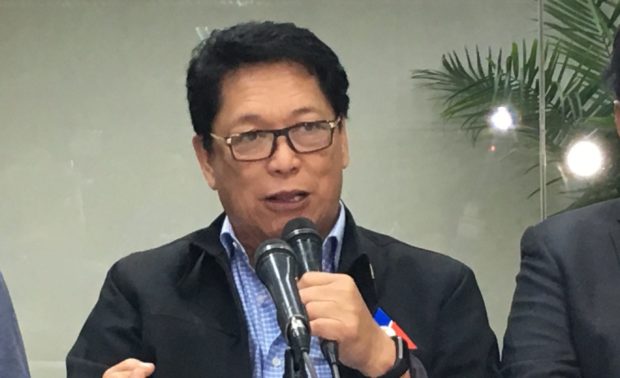
Labor Secretary Silvestre Bello. (File photo by DEXTER CABALZA / Philippine Daily Inquirer)
MANILA, Philippines — Labor Secretary Silvestre Bello III on Wednesday said he would recommend the partial lifting of the deployment ban of overseas Filipino workers (OFWs) to Kuwait.
“I had a fruitful meeting with my counterparts in Kuwait. Both sides agreed on the harmonized standard employment contract. I will talk with the POEA [Philippine Overseas Employment Administration] governing board to recommend the partial lifting of the ban,” Bello said.
The labor chief, however, maintained that the lifting of a total ban would only follow if the Kuwaiti government would provide an official status report is Filipina domestic workers Jeanelyn Villavende, Constancia Dayag, and Joanna Demafelis — who all died in the hands of their employers.
“In the case of Villavende, I wanted some validation of their claim that they [accused employers] are formally charged and they are behind bars. We have to be contented who have been charged and what are the nature of the charges,” he said.
Bello added that he would also want an official status report on the case of a Filipina household worker who was reportedly raped by a Kuwaiti police officer upon her arrival at the airport there.
READ: Arrest warrant issued vs Kuwaiti police officer who raped Filipina — DFA
Bello noted that the deployment ban once lifted would let the government allow skilled, semi-skilled and professional workers to be deployed in Kuwait.
Newly hired household workers would still covered by the prohibition, he said.
At present, the total deployment ban only exempts returning skilled workers and professionals.
Last week, Bello met with Kuwaiti officials and agreed on a standard employment contract to ensure the welfare and protection of OFWs.
Also present at that meeting were Labor Undersecretary Claro Arellano, Overseas Workers Welfare Administration (OWWA) head Hans Leo Cacdac, and Philippine Overseas Employment Administration (POEA) chief Bernard Olalia.
READ: PH reopens labor negotiations with Kuwait
Under the standard employment contract, employers are prohibited from keeping any of the worker’s personal identity documents, such as passports.
Workers would also be entitled to use their phones outside working hours provided that they would respect the privacy of their employer’s household.
The contract also provides that OFWs would be entitled to a paid full-day weekly break and would not be forced to work for more than 12 hours a day.
Workers should have no less than a one-hour break after five consecutive hours of work at least eight hours of sleep.
Employers are also prohibited from assigning a domestic worker outside of Kuwait or transferring him to another employer without the OFW’s written consent.
Otherwise, the worker will be repatriated to the Philippines at the expense of the employer.
Under the contract, employers are also mandated to ensure an acceptable quality of living for workers and to provide the medical treatment and nursing by registering the OFWs in the health system applicable in Kuwait.
“The harmonized employment contract should be retroactive and effective immediately,” Bello said.
Early in January, the Philippine government imposed a total deployment ban of OFWs to Kuwait due to the alleged attempt of the Kuwaiti government to cover up the true cause of the death of Villavende.
An autopsy conducted by the National Bureau of Investigation (NBI) on Villavende’s remains indicated that she was physically and sexually abused.
READ: Labor chief hits ‘cover-up’ on Kuwait OFW’s death
/atm

